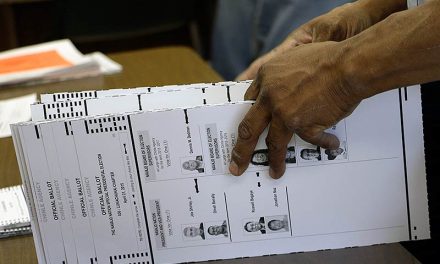
Capital Briefs | Vietnam vet receives keys to new home
On Tuesday, the key to a new home was presented to Vietnam War veteran Andrew Kelly, 73, in Tuba City, the president’s office reports.
The 1,300 square-foot hogan-style home has two bedrooms, a living room, kitchen, bathroom, and new appliances with electricity, plumbing, and sewage systems installed.
Kelly is Honágháahnii (One-Walks-Around clan), born for Tsé deeshgizhnii (Rock Gap People). His maternal grandfather is Naakai dine’é (The Mexican Clan) and his paternal grandfather is T? ‘ízí lání (Manygoats Clan).
He enlisted with the U.S. Army in 1969 and served with the 1st Air Cavalry Division as an Army medic with the rank of Spec. 4.
Kelly was awarded several medals for his service including the Silver Star, Purple Heart, Bronze Star, 2 Air Medal, Vietnam Service Medal, Vietnam Commendation Medal, and Combat Infantry Badge.
Kelly expressed appreciation and acknowledged his father, Andrew Kelly Sr., who served in the U.S. Army in World War II and his grandfather, Charles Kelly, who served in World War I.
Kelly said, “I’m excited for what we all started here. We, Navajo people, have to be an example to the rest of the world as the largest Indigenous nation.”
In addition to building new homes, the Navajo VA is overseeing repairs and improvements to more than 100 homes previously built for Navajo veterans between 2014 and 2017.
Leaders hail Biden’s signing of RECA extension bill
WASHINGTON – On Tuesday Navajo Nation and congressional leaders hailed President Joe Biden’s signature on the two-year extension of the Radiation Exposure Compensation Act.
Without the extension, which cleared both chambers of Congress in May, the RECA program was scheduled to sunset in July.
The two-year extension provides time to work with congressional members on a long-term solution that would extend the act until 2040.
Advocates also seek to expand downwinder eligibility based on geographic residency and the range of years that can be used to calculating exposure for individuals who worked in uranium mines, mills, or transporting uranium ore.
U.S. Sen. Ben Ray Luján, D-N.M., said, “Since being sworn in as senator, it has been a top priority to ensure that this critical program does not expire.
“But this fight is not over,” he said. “The federal government must do right by all Americans whose lives were impacted by radiation exposure in the national defense effort.”
Rep. Teresa Leger Fernández, D-N.M., said, “New Mexico is sadly no stranger to the health perils associated with uranium mining and nuclear testing.
“Nearly 77 years after the Trinity Test,” she said, “our communities still fall ill from radiation exposure.”
President Jonathan Nez thanked the Navajo Uranium Radiation Victims Committee and others, saying, “This measure was passed with bipartisan support for former uranium miners, downwinders, and many others who have to live with the devastating health effects to this day.”
Fort Defiance hospital scores a win in IHS lawsuit
FORT DEFIANCE – On Feb. 11, the Fort Defiance Indian Hospital Board Inc. filed suit in U.S. District Court in New Mexico against the Indian Health Service because the federal agency cut 90% of the hospital’s contract support cost funds.
The amount cut by the IHS is more than $16 million.
The hospital board argued in its suit that the action by the IHS clearly violated the Indian Self-Determination and Education Assistance Act.
On May 26, the court issued an injunction against IHS ordering it to immediately restore the illegally cut funding.
Oscencio Tom, president of the hospital’s board of directors, said, “This decision is a huge momentum shift in favor of FDIHB and most importantly, the patients that FDIHB serves.
Tom added, “We look forward to continued favorable decisions from the federal court until IHS is aware that FDIHB leadership will aggressively advocate for every dollar that is earmarked for the communities it serves.”
Council supports Kayenta, Dilkon applications for broadband grants
WINDOW ROCK – Two weeks ago, Navajo Nation Council delegates approved resolutions that support Kayenta and Dilkon chapters’ application for some of the $980 million set aside for broadband infrastructure in tribal communities by the Biden administration, according to the speaker’s office.
Under the National Telecommunication and Information Administration’s Tribal Broadband Connectivity Program, Kayenta applied for $6.5 million and Dilkon applied for $33.2 million.
Kayenta Chapter would use the grant to develop the Black Mesa and Comb Ridge/El Capitan region.
Dilkon would connect more than 10,000 homes in the District 7 chapters of Teesto, Indian Wells, White Cone, Jeddito and Greasewood Springs.
Delegate Elmer Begay said, “Almost all of the families that I represent do not have access to the internet, which has now become a necessity for everyday life.
“Having high-speed internet has become an essential utility to support the needs of the Navajo Nation and our people,” he said.
The applications are pending before the national program.
Leaders attend NM-Tribal Leaders Summit
WINDOW ROCK – On June 2, President Jonathan Nez, who is a candidate for re-election to the Nation’s high post, attended the New Mexico State Tribal Leaders Summit in Albuquerque.
Hosted by the New Mexico Indian Affairs Department, the summit is an annual government-to-government meeting where issues that affect the state’s 23 tribes are discussed.
Nez highlighted the Navajo Nation’s progress in the struggle against the COVID-19 pandemic and the importance of tribal consultation on issues including water resources, education, funding processes, and renewable energy.
Delegate Mark Freeland, speaking on behalf of the Navajo Nation Council, advocated for Navajo citizens who have been waiting for years for basic infrastructure.
Freeland said, “Navajo people are a large population within the state of New Mexico, but so many of our people still live without running water and electricity. It was an honor to speak on their behalf to ensure that the voices of our elders and youth are heard by state leaders.”
News media were restricted from attending the event except for Gov. Michelle Lujan Grisham’s opening remarks.
Lands around Tsodizil added to preservation effort
ALBUQUERQUE – A years-long effort to protect land around Tsodzil, a mountain held sacred by many tribes, got a major boost June 2 with the announcement that dozens of additional square miles will be set aside for wildlife, cultural preservation and recreation.
The $34 million effort by the national conservation group Trust for Public Land comes as New Mexico and the federal government look to preserve more natural landscapes as part of a nationwide commitment.
The goal is to increase green spaces, improve access to outdoor recreation and reduce the risk of wildfires as the pressures of climate change mount.
Trust for Public Land partnered with other organizations and foundations to purchase adjoining properties that make up the sprawling L Bar Ranch, which sits in the shadow of Mount Taylor just west of Albuquerque.
The more than 84 square miles includes grassland, rugged mesas and part of the Mount Taylor Traditional Cultural Property, which is on the state register of historic places due to its significance to Native Americans in New Mexico and Arizona.
Nearly 625 square miles in and around Mount Taylor, including lands within the L Bar project, were designated a traditional cultural property through decisions made by the state’s Cultural Properties Review Committee in 2008 and 2009. The New Mexico Supreme Court upheld the designation in a 2014 ruling.
Nearly $9M awarded for tribal transportation safety improvements
WASHINGTON – The U.S. Department of Transportation’s Federal Highway Administration announced that 51 tribes will receive $8.9 million for 58 projects for Fiscal Year 2021 to improve transportation safety.
This new grant comes in addition to $120 million to assist tribes in the coming years through the Tribal Transportation Program Safety Fund, made possible by the president’s bipartisan Infrastructure Law, and now available for fiscal years 2022 through 2026.
This combined funding will help fulfill the goals laid out in the Department’s National Roadway Safety Strategy announced earlier this year, which comes amid a troubling spike in roadway deaths of drivers, passengers, pedestrians, and cyclists, particularly among Native Americans.
“At a time when Native Americans are more likely than any other group in our country to lose their lives in roadway crashes, these funds from the president’s bipartisan Infrastructure Law will help improve safety in Indian Country,” said U.S. Transportation Secretary Pete Buttigieg.
eir first-ever transportation safety plans.
Among the FY 2021 grant recipients is the Navajo Nation in Arizona, which will receive a $981,000 grant to add safety features that can prevent drivers from driving off the road on high-risk routes.
The Infrastructure Law provides $3 billion for the Tribal Transportation Program for fiscal years 2022 through 2026.








 Highway 264,
Highway 264, I-40, WB @ Winslow
I-40, WB @ Winslow